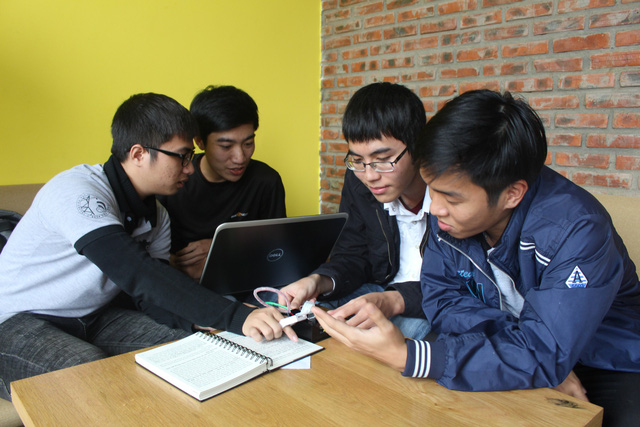Vietnamese students make finger reader for visually impaired people
29/04/2018 15:22
A group of four Vietnamese students have designed a text reader for people with visual disabilities which was honored in a technology competition held by foreign organizations.

The students who design an award-winning finger reader.
The device’s creators are Nguyen Thai Hoang, Nguyen Khanh Trinh, Ta Sinh Phuc and Bui Le Dat, students from the University of Science and Technology in Da Nang.
The finger reader, considered highly practical, has helped them bring home the first prize in ASU/AWS EduHackathon 2017, jointly organized by Arizona State University, Amazon Web Services – a business unit of Amazon.com, and a collective project known as Building University – Industry Learning and Development through Innovation and Technology Alliance (BUILD-IT Alliance).
The wearable prototype is simple in design, built upon the cloud computing formed by Amazon Web Services, and consists of three primary components: a camera, a processor and a speaker.
When a user moves the finger on which the device is mounted along a line of a text and presses its button, the camera takes photos of the characters; the resultant images are then converted into a suitable digital format before being sent to the processor.
This unit releases an audio track which can then be played on the speaker on headphones.
In this vein, people with handicap in sight can read all types of books and newspapers, without resorting to the Braille character system.
The idea of a finger reader occurred to the group when they recognized a common difficulty by the visually impaired.
“As far as I know, lots of people have made products teaching Braille to unsighted people, but many newspapers and books don’t use Braille and a number of these people are unable to read it. They’ll be put at a disadvantage as a result,” said Hoang, a member of the group.
The students were not deterred by multiple problems they faced within one year since the conception of the plan.
“The most difficult thing was that programming was quite challenging because we all major in automation,” Hoang said.
The creators had to repeatedly make a simulated finger to wear the text reader, which was time- and effort-consuming, he said.
Some people with visual impairment wished to use the device after it was completed.
“I really like reading books and newspapers, and hope to have a small simple device sold at a reasonable price for the purpose,” said Vo Van Nhat, one of the people who asked for help from the students.
The group has been trying to produce a Vietnamese version for the finger reader before it is used in a pilot test.
They are also replacing the current processor with a smaller, cheaper but equally effective one so that the wearable reader is offered at lower prices, around US$10-20.
They also said the device is expected to receive more functions like recognizing items of goods in the supermarket to ease the shopping experience of people with visual disabilities.
Theo tuoitrenews.vn